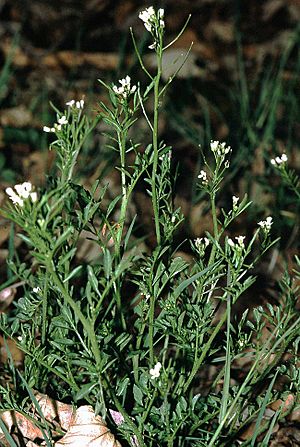Wavy bittercress facts for kids
Quick facts for kids Wavy bittercress |
|
|---|---|
 |
|
| Scientific classification |
|
| Kingdom: | Plantae |
| Clade: | Tracheophytes |
| Clade: | Angiosperms |
| Clade: | Eudicots |
| Clade: | Rosids |
| Order: | Brassicales |
| Family: | Brassicaceae |
| Genus: | Cardamine |
| Species: |
C. flexuosa
|
| Binomial name | |
| Cardamine flexuosa |
|
| Script error: The function "autoWithCaption" does not exist. | |
Script error: No such module "Check for conflicting parameters".
Cardamine flexuosa, also known as wavy bittercress or wood bitter-cress, is a small plant. It belongs to the cabbage family, which includes many common vegetables like broccoli and kale. This plant can live for one year (annual), two years (biennial), or a few years (short-lived perennial).
Contents
What Does Wavy Bittercress Look Like?
Wavy bittercress is a small flowering plant. It usually grows to be no taller than 30 centimeters (about 12 inches). It has a few short stems that stand upright.
Leaves and Flowers
The leaves of this plant are mostly found near the bottom. Each leaf is made up of about five pairs of small, rounded leaflets. This gives the leaf a feather-like look.
The flowers are very tiny and white, only about 3 to 4 millimeters wide. Each flower has six stamens, which are the parts that produce pollen.
Fruits and Seeds
After the flowers bloom, the plant produces fruits. These fruits are usually not taller than the flowers themselves. This helps tell wavy bittercress apart from a similar plant called Cardamine hirsuta, where the fruits often grow taller than the flowers.
Where Does Wavy Bittercress Grow?
Wavy bittercress is a common plant found across the British Isles and throughout Europe.
Habitat of Wavy Bittercress
In places like Ireland, you can often find wavy bittercress growing in woods. It prefers places that are shady and damp, making it well-suited for forest floors.
How Do People Use Wavy Bittercress?
In the Northeast Indian state of Manipur, wavy bittercress is eaten. It is known there as Chaantruk. People often use it to garnish a local dish called Eromba, adding flavor and freshness.
See also
 In Spanish: Cardamine flexuosa para niños
In Spanish: Cardamine flexuosa para niños
 | John T. Biggers |
 | Thomas Blackshear |
 | Mark Bradford |
 | Beverly Buchanan |

